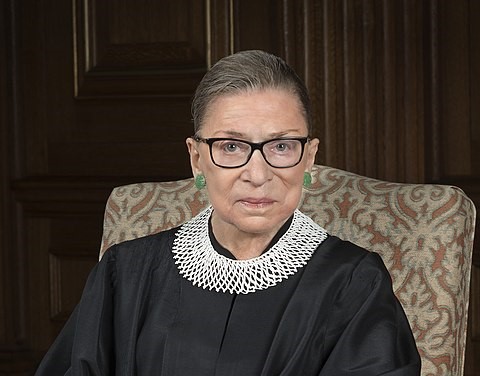Opinion: the Senate should honor Justice Ginsburg’s legacy

Justice Ruth Bader Ginsburg. Photo courtesy of the United States Supreme Court
October 1, 2020
As the nation mourns the recent death of feminist icon Ruth Bader Ginsburg, Trump’s decison to appoint a new Supreme Court Justice could mean dooms day for the future of the Supreme Court — especially considering the fight from conservatives to overturn Roe v. Wade, a milestone in the fight for women’s rights that protects a woman’s right to obtain an abortion with minimal government intervention.
During her 27 years of service on the Supreme Court, Ginsburg had become a catalyst for many of the rights that women enjoy today. Starting in 1996 when she sided with the majority in United States v. Virginia, declaring it unconstitutional for state-funded schools to bar women strictly because of their gender, Ginsburg never once slowed down in her fight for gender equality. She was also a major advocate for a woman’s right to choose, and was a crucial vote during the court’s decision to keep Roe v. Wade.
To say that Ginsburg was a large supporter of women’s rights is an understatement. She fought until her passing to give women most of the rights that they have today. In 2007, Ginsburg helped to pave the way towards equal pay after she demurred from the Court’s decision on the Ledbetter v. Goodyear Tire & Rubber Co. pay discrimination case. She also pushed to protect pregnant women in the workforce after arguing in 1972 that firing women because they are pregnant is sex discrimination. Fears amongst many American woman are growing after the passing of Ginsburg because she didn’t just support cis white women, she supported all women–regardless of their sexual orientation or race.
According to Ginsburg’s granddaughter, it was the justice’s last wish that her seat was not to be replaced until after the November election, a plea that President Trump has so disheartenedly ignored.
On Saturday September 26– only a week after Ginsburg’s death —Trump nominated Judge Amy Coney Barrett as the new Supreme Court Justice. Considering Barrett’s right extremist viewpoints and strict religious lifestyle, the Affordable Care Act and Roe v. Wade are both at risk of being overturned.
Roe v. Wade has been a common debate topic ever since its court ruling in 1973. The 1982 Abortion Control Act, passed in Pennsylvania, made it essential for woman to obtain consent from their husbands, or parents if they were a minor, before performing an abortion, according to Thirteen. A 24-hour waiting period was also put in place for any woman waiting to undergo an abortion procedure. Under this act, Planned Parenthood was then required to report all abortion procedures to the state. Furthermore during the Planned Parenthood v. Casey case in 1992, it was ruled that the bulk of the Abortion Control Act was, in fact, constitutional. However, the mandatory consent from husbands and parents for their wife or child to obtain an abortion was lifted and ruled an undue burden.
Planned Parenthood v. Casey is not as well known as Roe v. Wade, yet it holds more importance in the fight against women’s reproductive rights. Not only did this case reaffirm the abortion right given in Roe, it expanded the states’ rights to regulate it. This decision creates more legal controversy rather than moral controversy; however in 2005, the joining of Justices John Roberts and Samuel Alito posed a threat to the reservation of the abortion right in Planned Parenthood v. Casey. Especially now that Coney Barrett has created a conservative majority in the Supreme Court, Roe v. Wade and Planned Parenthood v Casey are at a much higher risk of being overturned than they were before.
Some love Coney Barrett for one reason: her views on abortion. Ever since his campaign in 2016, President Trump has pledged to appoint Judges that will overturn Roe v. Wade, according to NBC. Now moving forward with his nomination, women are at risk of losing the right to their own bodies. Coney Barrett has said that abortion is “always immoral.” Now with a female voice arguing against giving women their own reproductive rights, the Supreme Court will be at an advantage when arguing for the removal of Roe.
Coney Barrett is also a very strict Catholic. According to The Nation, the new justice has stated that she could, and should, remove herself from cases involving conflict between the church and state. This is a large red flag that Americans need to keep an eye on because she will remove herself from court cases discussing laws between her church and the government, yet she will remain on court cases discussing human rights issues, such as abortion.
Coney Barrett has only had one goal as her time as judge — to get her hands on an abortion case. She uses her religion as an excuse to back out of cases involving issues such as the death penalty, yet in reality she is just an extremist who’s main goal is to remove Roe v. Wade and remove women’s rights to their own bodies. Now with her nomination, it seems as if Roe v. Wade will soon be coming to an end. As Amy Coney Barrett takes her seat in the Supreme Court, every door that Ginsburg has opened in the fight for women’s rights, will soon be closed because of Coney Barrett’s nomination.











